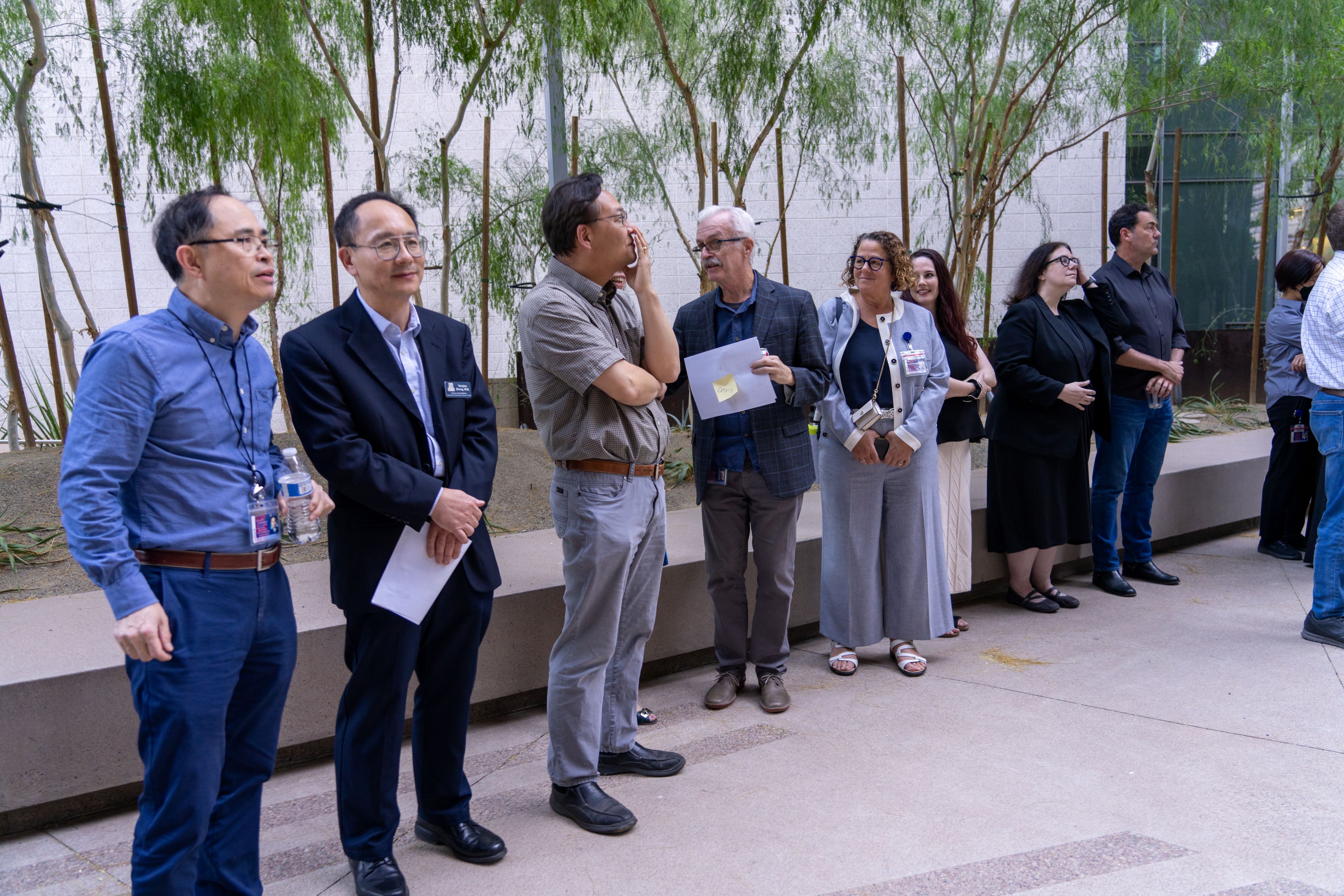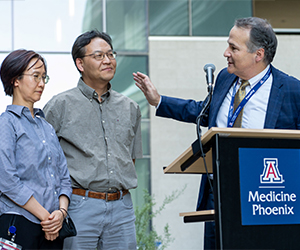
Faculty Reception Welcomes 16 New Researchers to the College

The University of Arizona College of Medicine – Phoenix hosted a reception to introduce the new scientists to more than 100 invited guests, including college, community and campus colleagues. Dean Fredric Wondisford, MD, MS, MBA, shared his excitement in welcoming these team members in supporting the U of A College of Medicine – Phoenix’s mission to optimize health care in Arizona through biomedical research and innovation.
Following the State of the College address, attendees gathered in the Grand Canyon patio to learn about their research interests and diverse backgrounds. The formal remarks were followed by networking.

These colleagues share a commitment to building a collaborative environment that fosters better understanding of the mechanisms of disease and novel therapies to address debilitating conditions, such as mental health disorders, cardiac arrhythmia, age-related hearing loss, liver disease and others.
Establishing the college as a hub for medical discoveries and innovation is a key initiative.
Meet the Researchers
Ebenezer Yamoah, PhD, joins the college as a professor for the Department of Translational Neurosciences. Dr. Yamoah’s distinguished research explores the genetic and cellular mechanisms of hearing and age-related hearing loss.
Nipavan Chiamvimonvat, MD, serves as the Chair of the college’s Department of Basic Medical Sciences. She has dedicated her career as a physician-scientist to treating patients with cardiac arrhythmia disorders.
Alexander Niculescu, MD, PhD, is a professor in the Department of Psychiatry. A psychiatrist and geneticist, his research interests use genomics and phenomics to provide personalized mental health treatment and prevention.
Isabelle Schrauwen, PhD, a tenured associate professor at the college’s Department of Translational Neurosciences, comes from Columbia University Medical Center Department of Neurology and Center for Statistical Genetics. Dr. Schrauwen’s research interests include neurological and neurodevelopmental disorders.
Coming from Cornell University Department of Neurobiology, Melissa Warden, PhD joins the college as a tenured associate professor at the Department of Translational Neurosciences. Dr. Warden’s research uses highly advanced technology to study neuronal circuitry that mediates learning and behavior.
Aaron McGee, PhD, also joins the Department of Translational Neurosciences as a tenured professor. Since becoming an independent researcher in 2009, his lab has helped pioneer advance the understanding of genes and mechanisms that regulate experience-dependent brain plasticity within the brain’s visual circuitry.
Yanqiao Zhang, MD, FAHA, FASSLD, serves as director of the Diabetes, Obesity and Metabolism Program and professor in the Department of Internal Medicine. He investigates fatty liver disease and dysregulation of the lipid and glucose metabolism. Dr. Zhang is currently the principal investigator on three NIH R01 grants and one American Heart Association (AHA) Translational Project Award.
Liya Yin, MD, PhD, serves as a professor in the Department of Internal Medicine and is a member of the TCRC. Dr. Yin’s research has been funded by the AHA and the National Institutes of Health and focuses on lipid metabolism and endothelial dysfunction in diabetes.
Ling He, MD, PhD joins the college as a tenured professor in the Department of Basic Medical Sciences and director of the Section of Metabolic Diseases. His laboratory is working on defining molecular mechanism of effects on mitochondrial dynamics. Dr. He’s research remains focused on glucose and lipid metabolism.
Shuwei Hu, PhD, a member of the TCRC, joins the college as an assistant research professor of the Department of Internal Medicine. Dr. Hu’s research focuses on understanding the pathogenesis of disease associated in fatty liver disease and obesity.
Jiayou Wang, PhD, serves as a member of the TCRC and an assistant research professor in the Department of Internal Medicine. Dr. Wang’s research expertise focuses on investigating underlying developments of fatty liver disease and atherosclerosis, especially in patients with obesity and type 2 diabetes.
Mijung Kwon, PhD, joins the college as an associate research professor in the Department of Internal Medicine. Dr. Kwon specializes in the investigation of cancer metastasis and tumor suppressors.
Hyok Joon Kwon, PhD, is an associate research professor in the Department of Internal Medicine. Dr. Kwon’s research investigates how glucose metabolism impacts Type 2 diabetes.
Rishi Popat, DMD, DMSc., joins the college from his private practice as founder and orthodontist at Popat Orthodontics & Madison Pediatric Dentistry. Dr. Popat will work as an assistant professor in the Department of Surgery. Among his achievements, he invented and patented a palatal expander for early orthodontic intervention.
Maria Cristina Perez Flores, PhD, serves as an associate research professor in the Department of Translational Neuroscience. Dr. Perez Flores’s background in biophysics, physiology, molecular biology and medicine allows her to design and analyze data via pharmacological, electrophysiological and imaging techniques.
Freya Spielberg, MD, MPH, is a professor and vice chair of Research for the Department of Family and Community Medicine. Dr. Spielberg’s expertise includes developing practice-based research networks and the negative impact of climate change on primary care.
Jeong Han Lee, PhD, joins the college as an associate research professor for the Department of Translational Neurosciences. Dr. Lee investigates hearing loss, focusing on the roles of inner and outer hair cells and various mechanisms in the ear.
Ryan Lee Woltz, PhD, serves as an assistant professor in the Department of Basic Medical Sciences. Dr. Woltz uses his skills as a computational biologist to identify targets for therapeutics to treat cardiac arrhythmias, specifically atrial fibrillation.
Topics
About the College
Founded in 2007, the University of Arizona College of Medicine – Phoenix inspires and trains exemplary physicians, scientists and leaders to advance its core missions in education, research, clinical care and service to communities across Arizona. The college’s strength lies in our collaborations and partnerships with clinical affiliates, community organizations and industry sponsors. With our primary affiliate, Banner Health, we are recognized as the premier academic medical center in Phoenix. As an anchor institution of the Phoenix Bioscience Core, the college is home to signature research programs in neurosciences, cardiopulmonary diseases, immunology, informatics and metabolism. These focus areas uniquely position us to drive biomedical research and bolster economic development in the region.
As an urban institution with strong roots in rural and tribal health, the college has graduated more than 1,000 physicians and matriculates 130 students each year. Greater than 60% of matriculating students are from Arizona and many continue training at our GME sponsored residency programs, ultimately pursuing local academic and community-based opportunities. While our traditional four-year program continues to thrive, we will launch our recently approved accelerated three-year medical student curriculum with exclusive focus on primary care. This program is designed to further enhance workforce retention needs across Arizona.
The college has embarked on our strategic plan for 2025 to 2030. Learn more.